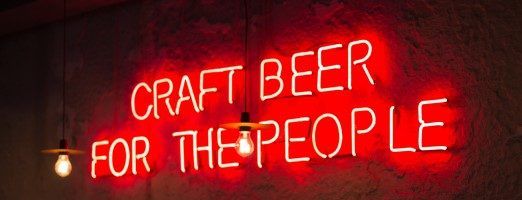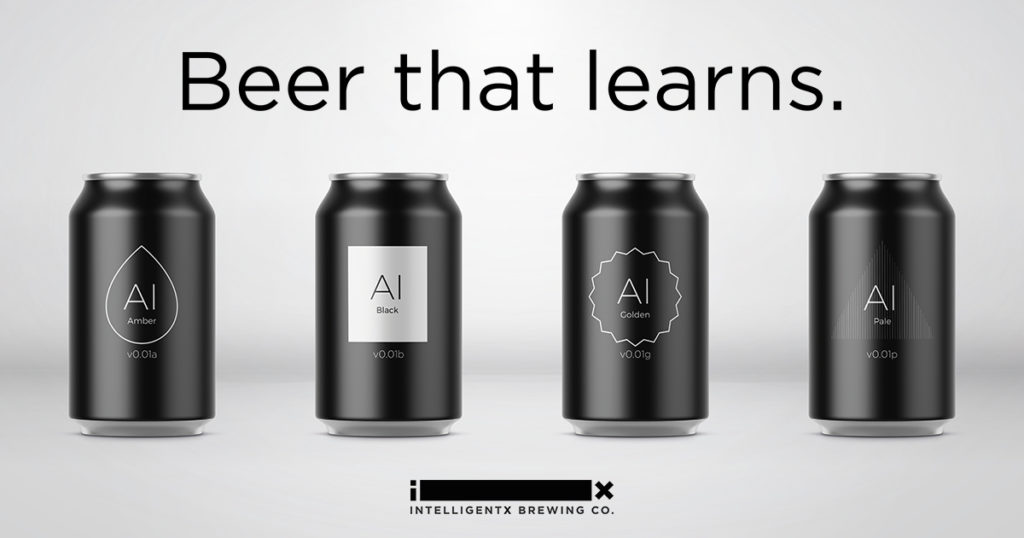Craft beer by the people, for the people

Would you ever buy a craft beer whose taste is constantly changing? A UK startup is challenging the way companies approach product development by leveraging Machine Learning to improve its beer recipes based on drinkers’ feedback.
Would you ever buy a craft beer whose taste is constantly changing?
In the last few years, applications of Machine Learning and Artificial Intelligence have flooded the Consumer Goods Industry. From targeted advertising to hyper-personalized promotions, the main focus has been to predict and influence the consumption patterns of customers [1]. Nevertheless, few well-known consumer products have radically changed based on the feedback of the customer. For example, other than overall bitterness, recipes of the most iconic beers in the US have not changed much during the last 40 years [2].
On the other side of the spectrum, Intelligentx, a UK startup founded in 2016, is challenging the way companies approach product development by leveraging Machine Learning algorithms to improve its beer recipes based on drinkers’ feedback. You’re reading this right, they are changing the taste of their beer and no two batches will ever taste the same.

Intelligentx takes customer feedback through an online system and the data is integrated with a machine learning algorithm to alter the recipe and enable the system to immediately brew the next batch of beer [3]. Every bottle’s label has a code that connects you with a Facebook Messenger bot that complements the process by asking different sets of questions related to the aroma, taste, and looks of the beer. Levels of carbonation, bitterness and alcohol content all change based on how people are responding. The algorithm produces new recipes every month incorporating the feedback [4]. In addition to modifying the mix of the typical 4 beer ingredients (hops, water, yeast, and grain), approximately 1,000 wildcard ingredients could potentially be inserted into the recipe to keep the beer changing and to teach the algorithm [5].
Intelligentx’s strategy
In the short-term, the management team of Intelligentx will maintain its product development process of optimizing its recipes with a focus on the craft beer segment. In addition, they are expecting to expand their current production of 1,000-liter batch per month [6]. Finally, it could be speculated that management will continue to expand their beer offering, based on their decision of migrating from one to four beers after just one year of operation.
In the medium-term, the plans for Intelligentx are extremely ambitious. First, the company has the aspiration to improve its data collection process. Their plan consists of collecting data from pubs and bars to discover exactly what drinkers want. “You could have a smart pub, where the glasses are connected [to the AI engine], where we know how much you’ve drunk, at what temperature, how quickly, how much you left in the bottom of the glass”, mentioned the co-founder [7]. Second, the company is not only focusing on beer. They have the vision of “building a future where all the things you buy, not just beer, are made just for you” [8]. Therefore, the founders are looking for other products that can be improved in a similar fashion, such as coffee, chocolate, or perfumes [9].
Opportunities and recommendations
In addition to Intelligentx current strategy for the short and medium term, I consider that there are two main opportunities on prioritization of future products and customer retention.
On the prioritization of future products, I would advise the co-founders to favor products that have a lower development lead time, are less capital intensive, and are quickly consumed. In their product development process, the product’s quality is linked to the amount of data that the algorithm can process; therefore, minimizing the lead time (time to market) and being easily consumable (e.g. a perishable good), would increase the number of data points necessary to feed the program. Additionally, choosing a less capital intensive product (as opposed to beer) would provide the possibility to increase customization, without a substantial increase in the cost-per-unit of the product.
Customer retention will be one of the key challenges for the company going forward. Rob McInerney, co-founder of Intelligentx said that “by making mistakes, [algorithms] learn to better interpret people in the future” [10]. But how likely will a person that unluckily got a “bad batch” of beer repeat a purchase and provide the valuable feedback necessary for the product to improve? I would recommend Intelligentx to create a scheme that compensates customers when the algorithm identifies that they received a “bad batch.” For example, providing customers with a personalized thank you message for providing feedback and a free beer coupon.
Open questions
- Which product should Intelligentx launch next and why? (e.g. coffee, perfume, chocolate)
- How sustainable is the competitive edge of Intelligentx? Would it be feasible for larger breweries to catch-up and also change their recipes using the same technology?
- How should Intelligentx think about the tradeoffs between having a few ever-changing products vs. many super-customized products?
(785 words)
[1] Rick Braddock, “To Compete with Amazon, Big-Name Consumer Brands Have to Become More Like It,” Harvard Business Review, June 14, 2018, https://hbr.org/2018/06/to-compete-with-amazon-big-name-consumer-brands-have-to-become-more-like-it, accessed November 2018.
[2]Sarah Ellison, “After Making Beer Ever Lighter, Anheuser Faces a New Palate,” The Wall Street Journal, April 26, 2006, https://www.wsj.com/articles/SB114601602889736048, accessed November 2018.
[3] “Innovations in Artificial Intelligence, Deep Learning, Predictive Analytics, and Blockchain,” Frost & Sullivan, April 21, 2017, accessed November 2018.
[4] Adam Satariano, “Your Next Beer Might Be Made by Artificial Intelligence,” Bloomberg, December 15, 2016, https://www.bloomberg.com/news/articles/2016-12-15/your-next-beer-might-be-made-by-artificial-intelligence, accessed November 2018.
[5] “Beer 2.0 — Can AI make your pint taste better?,” Financial Times Magazine, June 2, 2017, https://www.ft.com/content/ffc3a680-4582-11e7-8d27-59b4dd6296b8, accessed November 2018.
[6] Ibid.
[7] Ibid.
[8] Intelligentx Brewing Co., https://get.intelligentx.ai/, accessed November 2018.
[9] “Innovations in Artificial Intelligence, Deep Learning, Predictive Analytics, and Blockchain,” Frost & Sullivan, April 21, 2017, accessed November 2018.
[10] TEDx Goodenough College. “Using artificial intelligence to make beer better,” Youtube, published August 10, 2017, https://www.youtube.com/watch?v=og5B5RNJ7Gw, accessed November 2018.



This is a really interesting article! I’d be curious as to know how sustainable Intelligentx’ business model is. It’s definitely a cool concept, but it seems that it doesn’t always make sense to continually iterate with inputs from random people. Not everyone’s palate may be suitable to adjust the beer and there may just be different tastes. How would the company know when they have hit a jackpot recipe?
I see a way forward that combines your customer retention recommendation with the brewery’s desire for better data collection: a pub of their own. By creating an experimental brewpub that offers a few constantly improving staples and a few highly variable wildcards, they can create an environment that encourages people to try and react to their beer much more quickly than their current process. Having a large variety of delicious but “safe” beers available will help with retention. To drive innovation, they could offer smaller pours of the wildcard beers and immediately give discounts for those who participated in the iterative learning process by reviewing their beers. This could speed the iteration time by getting more data faster. I think that AI-enabled beer glasses are a bit excessive, but if they can make it work, it would give them a data-collection advantage over their rivals.
Thanks for sharing – I would have never guessed that machine learning was being used in this way!
The beer industry is an interesting choice of place to test this concept. I would think that data and feedback received from customers would be difficult to interpret simply because everyone has different preferences when it comes to beer. Also, I would think an additional challenge from the customer perspective might be the opposite of the “bad batch” concern you mention – what happens if I find a beer that I love, but then can never find it again because it has been changed based on the algorithm?
On a separate note, I think the idea of a “smart pub” is fascinating and could be extremely useful in understanding other aspects of the business (e.g., Demand forecasting, customer segmentation, etc.)
I think this is an extremely interesting take on how Machine learning and crowdsourcing come together to create an interesting business model . However, for something I would be interested in would be how this plays out. I would imagine that ML in this case would converge onto a singular taste which is an amalgamation of a bunch of different palates. However given how tastes combine in complex ways and not as a smooth function, using an algorithm which depends on incremental improvement to get better might make a product which suits no single palate as there might not be a smooth signal and only noise.